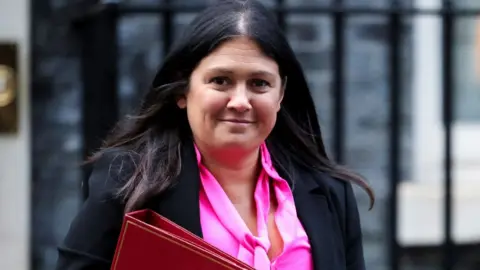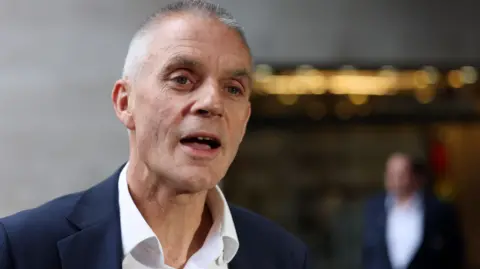
Steven McIntoshEntertainment reporter
 Reuters
ReutersCulture Secretary Lisa Nandy has said she shares a “real concern” that political appointments to the BBC board damage trust in the corporation.
The make-up of the board has come under fresh scrutiny this week following the resignation of director general Tim Davie, after a leaked memo raised editorial concerns including the way Panorama edited a speech by President Trump.
Nandy told BBC Radio 4’s Today the perception of political influence is “a problem”, adding she would be examining the issue as part of the corporation’s next charter review.
The culture secretary also indicated that a string of recent scandals at the BBC suggested the corporation should have “people at a very senior level with a journalistic background”.
Davie resigned on Sunday, along with the corporation’s CEO of News Deborah Turness, after a memo raising concern about editorial decisions and perceived institutional bias was leaked to the Daily Telegraph.
A week of damaging headlines has followed, with some media commentators putting the spotlight on BBC board member Sir Robbie Gibb, a former communications director under Conservative prime minister Theresa May.
Nandy acknowledged that the “sheer number of questions” she had received about Sir Robbie in the House of Commons earlier this week suggested “there is a real concern, which I share, that political appointments to the board of the BBC damaged confidence and trust in the BBC’s impartiality”.
“That is something we will be looking at as part of the charter review.”
Asked by presenter Nick Robinson about Sir Robbie’s current role on the board, Nandy said he was appointed by the previous government, and would remain in post until 2028.
The current charter states that board members would have to be “unwilling, unfit or unable to discharge their duties” in order to justify their removal, she said, adding: “In these particular issues instances I’m unable to act.”
However, other commentators this week have drawn attention to the BBC’s appointment of Labour figures over the years, which have not attracted as much criticism.
Former BBC presenter Andrew Neil highlighted figures such as James Purnell, a former Labour MP who went on to a senior BBC role, Labour party donor Gavyn Davies who chaired the board of governors, Labour council leader Michael Lyons who chaired the BBC Trust, and former director general Greg Dyke, who was a Labour donor.
 EPA
EPADavie’s resignation came after a string of BBC scandals this year. As well as Panorma, the corporation has faced negative headlines about Strictly Come Dancing, MasterChef presenter Gregg Wallace, two Gaza documentaries, and Bob Vylan’s performance at Glastonbury.
Some have suggested the priority for choosing the next director general should be a strong editorial background to help better grasp similar scandals in the future.
Nandy said she would not tell the BBC what to do when it came to appointing the next director general, but she added there is an “emerging thread through many of the challenges the BBC has had”.
“That thread is that the editorial standards and guidelines that the BBC has are in some cases not robust enough and in other cases not consistently applied which leaves individual journalists, presenters and editors in quite a difficult position on a number of occasions,” she said.
“I think that does demand that there are people at a very senior level with a journalistic background who are able to uphold those standards.”





